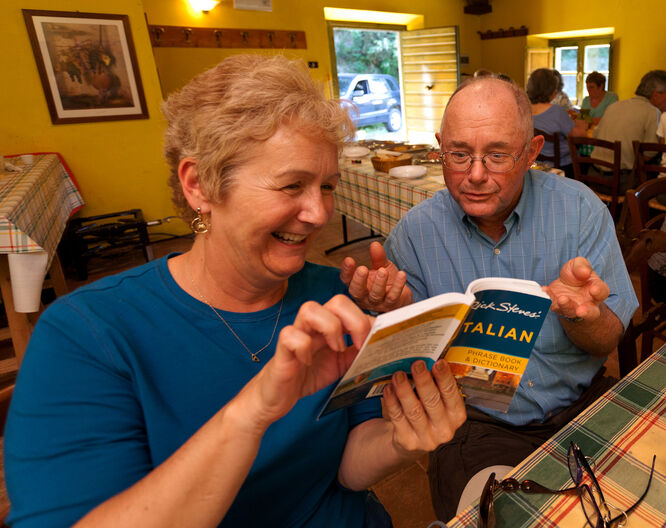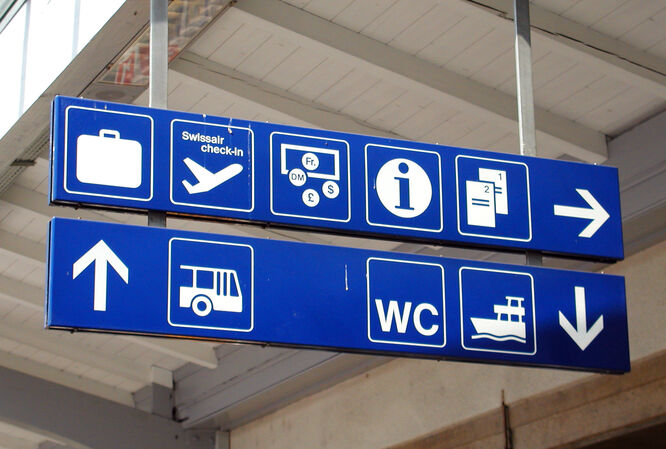Confessions of a Monoglot
By Rick Steves
While it's nothing to brag about, I am a miserable linguist. I got into the University of Washington, which required two years of a foreign language, thanks to an intensive summer French class at a local community college.
It was probably the worst month of my life. The eight ways the French pronounce "uh" pretty much broke my spirit. But I struggle on, being the travel guy who basically speaks only English.
If I spoke other languages, I undoubtedly would enjoy a deeper understanding of the people and cultures I visit. Still, I manage just fine hurdling the language barrier when it comes to researching and writing guidebooks, leading tours, producing TV shows, and simply enjoying Europe.
Of course, English speakers can afford to be lazy, because English is the world's linguistic common denominator. When a Greek meets a Norwegian, they speak English. (What Greek speaks Norwegian?)
Imagine if each of our 50 states spoke its own language. That's close to the European situation, but they've done a great job of minimizing communication problems. Most information that a traveler must understand — such as road signs, menus, telephone instructions, and safety warnings — is presented either in English or in universal symbols.
And rest assured that any place trying to separate tourists from their money will always find a way to explain how to spend it.
But while English may be Europe's lingua franca, that doesn't mean everyone you encounter will be fluent — and not everyone will understand American English. Europeans are more accustomed to Brits, who use words like "holiday" (not vacation), "torch" (not flashlight), and "petrol" (not gas). Skip the euphemisims: If you say "restroom" or "bathroom," you'll get no relief. "Toilet" is direct, simple, and internationally recognized.
My advice, if you want to be understood, is to keep your messages grunt-simple. I talk like a Dick-and-Jane primer, choosing easy words and clearly pronouncing each syllable (po-ta-to chips).
A single noun often can do the work of an entire sentence. If my car is broken in Portugal, I don't say, "Excuse me, my car is broken." I point to the vehicle and say, "Auto kaput." A one-word question ("Photo?") is more effective than something more elegant ("May I take your picture, sir?").
Even with no real language in common, you can have some fun communicating. It's OK to look goofy — use dynamic hand and facial expressions. Consider this profound conversation I had with a cobbler in Sicily:
"Spaghetti," I said, with a very saucy Italian accent.
"Marilyn Monroe," was the old man's reply.

"Mamma mia!" I said, tossing my hands and head into the air.
"Yes, no, one, two, tree," he returned, slowly and proudly.
By now we'd grown fond of each other, and I whispered, secretively, "Molto buono, ravioli."
He spat, "Be sexy, drink Pepsi!"
Waving good-bye, I hollered, "No problema!"
"Ciao," he said, smiling.
The point is: Butcher the language if you must, but communicate. I'll never forget the clerk in the French post office who flapped her arms and asked, "Tweet, tweet, tweet?" I understood immediately, answered with a nod, and she gave me the airmail stamps I needed. At the risk of getting birdseed, I communicated successfully. If you're hungry, clutch your stomach and growl. If you want milk, "moo" and pull two imaginary udders. If the liquor was too strong, simulate an atomic explosion starting from your stomach and mushrooming to your head.
When all else fails, a notepad can work wonders. Words and numbers are much easier to understand when they're written rather than spoken (especially if you're mispronouncing them). My back-pocket notepad is my constant travel buddy.
As dominant as English may be, it's just good manners to know common polite words in the local tongue. The top 10 words in any language — mostly niceties like "please," "thank you," and "excuse me" — are more important than the next 200 words combined. Things go easier if you begin each request with the local "please" ("Bitte, toilet?"). Even a rudimentary awareness of the native language wins the respect of those you'll meet.
My fundamental key to communication is to treat most problems as multiple-choice questions. I make an educated guess at the meaning, and proceed confidently as if I understand. At the hotel breakfast table the waitress asks me a question. I don't understand a word she says, but I tell her my room number.
With this approach I find that 80 percent of the time I'm correct. Half the time that I'm wrong, I never know it, so it doesn't really matter. And 10 percent of the time, I really blow it. By assuming I understand what's going on, my trip becomes easier — and sometimes much more interesting. Vaulting over that pesky language barrier is always worth the leap.

